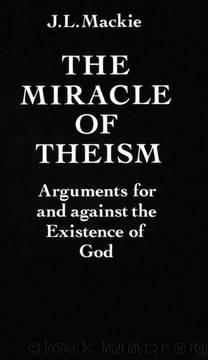The Miracle of Theism: Arguments For and Against the Existence of God by John L. Mackie

Author:John L. Mackie [Mackie, John L.]
Language: eng
Format: epub
Published: 2010-11-26T22:11:00+00:00
(b) Hume's Dialogues Discussion
What are we to say about these five points? I shall postpone the fourth until Chapter 9, where I shall be considering the problem of evil as a whole. The first and the fifth depend upon the way in which the design argument and its conclusion are formulated. Hume presents it as an argument from analogy. Houses, watches, and so on are produced by human designers; the world is a bit like a house or a watch or a collection of houses, watches, and the like; therefore it is probably produced by something like a human designer. Thus stated, the initial analogy is indeed pretty remote, and any conclusion to which it points is very vague, so that no new inferences about the world or human life could reasonably be drawn from it. Another approach is to take the argument as introducing a god simply as that which causes or explains or is responsible for the natural world. There is then no tentative or probabilistic inference, but rather a sheer assumption that there is something that fills this bill; but again, since this entity is introduced and described only in relation to what it is assumed to produce, no new conclusions will follow from the claim that it exists. However, the argument can be recast as the confirming of a hypothesis, and then this hypothesis can be made as determinate and as fruitful of further conclusions as we please. But the more we put into the hypothesis, the further it goes beyond the evidence; so the less well will it be confirmed by that evidence, and the more exposed will it be to the competition of rival hypotheses.
These, however, are general constraints which apply to explanatory scientific hypotheses and theories of whatever sort. And it is simply not true that such hypotheses and theories are useless in this sense. On the contrary, they do support predictions which both give genuine and fairly reliable information and allow the construction of artefacts of new kinds-notably computers, television sets, nuclear weapons, and the other blessings of civilization. But is there some reason to suppose that these constraints are particularly damaging to the theistic hypothesis as an explanation of the `marks of design'? I think there is, because the theistic hypothesis does not differentially explain specific phenomena in the way that successful scientific theories do: it does not explain why we have these phenomena rather than others. A scientific hypothesis is often confirmed by its success in explaining exactly what is observed, by tying up what on an alternative view remain as loose ends, and perhaps by predicting further, otherwise unexpected, observations which are then made, or possible constructions which are then successfully carried out. This the theistic hypothesis does not do. It may be objected that there are also general scientific theories which do not determine predictions: Darwin's theory of the origin of species by descent and modification through natural selection would be an example. But Darwin's theory still explains
Download
This site does not store any files on its server. We only index and link to content provided by other sites. Please contact the content providers to delete copyright contents if any and email us, we'll remove relevant links or contents immediately.
| African | Asian |
| Australian & Oceanian | Canadian |
| Caribbean & Latin American | European |
| Jewish | Middle Eastern |
| Russian | United States |
4 3 2 1: A Novel by Paul Auster(11052)
The handmaid's tale by Margaret Atwood(6854)
Giovanni's Room by James Baldwin(5879)
Big Magic: Creative Living Beyond Fear by Elizabeth Gilbert(4723)
Asking the Right Questions: A Guide to Critical Thinking by M. Neil Browne & Stuart M. Keeley(4576)
On Writing A Memoir of the Craft by Stephen King(4214)
Ego Is the Enemy by Ryan Holiday(3991)
Ken Follett - World without end by Ken Follett(3973)
The Body: A Guide for Occupants by Bill Bryson(3802)
Bluets by Maggie Nelson(3711)
Adulting by Kelly Williams Brown(3671)
Guilty Pleasures by Laurell K Hamilton(3587)
Eat That Frog! by Brian Tracy(3514)
White Noise - A Novel by Don DeLillo(3436)
The Poetry of Pablo Neruda by Pablo Neruda(3367)
Alive: The Story of the Andes Survivors by Piers Paul Read(3311)
The Bookshop by Penelope Fitzgerald(3228)
The Book of Joy by Dalai Lama(3218)
Fingerprints of the Gods by Graham Hancock(3214)
